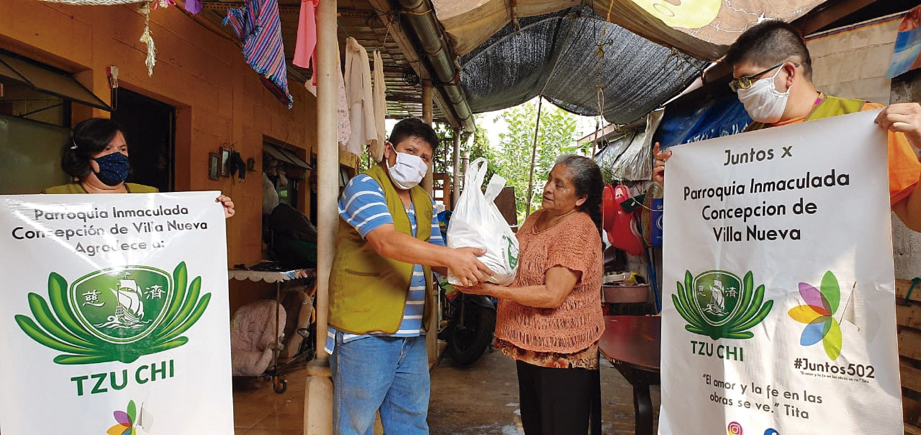Guatemala is a land of volcanoes, there are always some active and sometimes too many (2 years ago the Fuego volcano caused 319 deaths, thousands according to the locals). And it is also a land where there is a deep and simple faith rooted even in remote villages and expressed in 22 languages of Mayan origin.
In these times of confinement and special difficulty, and like an erupting volcano, countless solidarity initiatives are emerging in a country with a very high percentage of informal work (more than 60 %) and poverty. The prompt response of young university students and varied projects that reach hundreds and hundreds of people is striking. It is the Christian spirit that comes to the fore in times of need. Even in the streets of the capital we see people with white flags asking for food. It is a wake-up call for everyone and especially for the ecclesial institutions, which are working hard during this season.
Father Luis Felipe Alonso, Episcopal Vicar and pastor of Immaculate Conception in Villa Nueva, a huge and populous parish on the outskirts of the capital, gives us a close-up view of some of the initiatives: "I was just leaving our oratory to go celebrate Holy Mass when I saw someone calling me on my cell phone. In those circumstances I don't usually answer, but something told me to take the call. And so I did. It was one of those 'champion' ladies of charity who said to me between sobs: 'Father, I need to tell you something. I was on my way home when I saw a white flag in a window, excuse me, but I am very loud (in this country it is said of the person who cries a lot)', she continued between sobs: I went and asked why the white flag was there. Between fear and distrust appeared the face of a young woman, whom I asked about her situation and she told me: 'I was a school bus monitor, and for three fortnights now I haven't received a penny. I am a single mother and I have three small children. I no longer have anything to eat. I, father -and she was still crying- said, 'I am a single mother and I have three small children., I could not remain indifferent and promised to help her. So, you, give me something'. I could not remain indifferent and promised to help her. I was deeply touched. Just that day, another group of ladies who help in our charities had made bags of groceries for the needy. And I gave her two of those bags to take with her. And so she did, in tears".
White flags
The white flags are just one more face of the devastating effects that the Covid-19 pandemic is causing in our countries," continues parish priest Luis Felipe Alonso. In itself, people live with their shirts up, they have no savings, they live from the day's work. If there is no work, there is no income. If there is no income, there is no food. We give him the floor.
In our parish, he points out, we have been organizing ourselves to be able to serve the most needy more effectively. Among other initiatives, we have divided the parish territory into 10 sectors. Each sector has its own local organization made up of local people. This structure serves especially for evangelization, but also for charitable action, through what we call the Social Pastoral.
When we started these grants at the beginning of the pandemic in our country, 100 beneficiaries signed up. A few weeks later they became 300. Yesterday they were distributed to 502 beneficiaries. We expect the number of applications to reach 1,000 in 15 days.
Divine Providence does not leave us. Apart from what we collect among our faithful, other people, companies and foundations help us in many ways. There is a lot of solidarity. For example, a few days ago I called a friend and told him: "In your neighborhood there are as many rich people as there are poor people in mine. So I name you my milk and cereal collection center.". And so it has been. Wonderful generosity of so many people. The milk and cereal are for the beneficiaries who declared to have children under 8 years old (they don't know it).
Difficult times are ahead. It is a great challenge to continue helping so many people. In order to achieve a better delivery of food and to dignify people, we are working to promote what we want to call parish commissaries. The idea is to organize small convenience stores, to which only those who are registered in our aid programs will be able to go.
Systems engineers are already at work designing the programs that will allow us to be very efficient in the control and delivery of the supplies. No money will be handled. Only a cell phone. The sites will have wifi network for those who cannot access easily because they lack service (in our country there are two cell phones per person, according to statistics).
It is a revolution of charity. And someone might ask: what do they get out of it? The best payment was told to me by a girl from our parish who helps in the distribution of bags of groceries. She said to me: "I like to help. It makes me happy. But what I like the most is to see the smile of gratitude of those who receive the help, and they always say thank you, God repay you.".
These are times of mercy, let us expand our hearts! The poor cannot wait.
Episcopal Vicar and Pastor of the Immaculate Conception in Villa Nueva, Guatemala.











